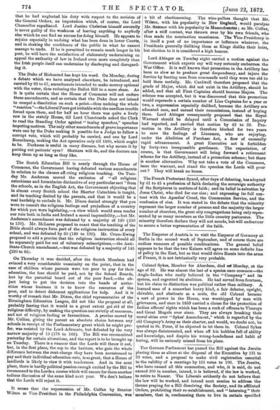On Thursday it was decided, after the Scotch Members had
evinced a very considerable unanimity on the point, that in the case of children whose parents were too poor to pay for their education, the fees should be paid, not by the School Boards, but by the parochial board out of the poor fund,—the ob- ject being to put the decision into the hands of autho- rities whose business it is to know the resources of the poor, and to detect dishonest applications for help. And it is worthy of remark that Mr. Dixon, the chief representative of the Birmingham Education League, did not like the proposal at all, probably fearing that it would to a great extent get rid of the religious difficulty, by making the question one strictly of resources, and not of religious feeling or favouritism. A proviso moved by Mr. Collins, giving the parent an absolute choice between any schools in receipt of the Parliamentary grant which he might pre- fer, was resisted by the Lord-Advocate, but defeated by the very narrow majority of 12 (178 to 166). The Bill was recommitted yesterday for certain alterations, and the report is to be brought up on Tuesday. There is a rumour that the Lords will throw it out, but, in the first place, the sop to the heritors, who gain the whole difference between the rent-charge they have been accustomed to pay and their individual education-rate, is so great, that a House of landlords is likely to view it with tenderness. And in the next place, there is hardly political passion enough excited by the Bill to recommend to the Lords a course which will ensure for them another tedious discussion of the same kind next year. We don't believe that the Lords will reject it.


































 Previous page
Previous page